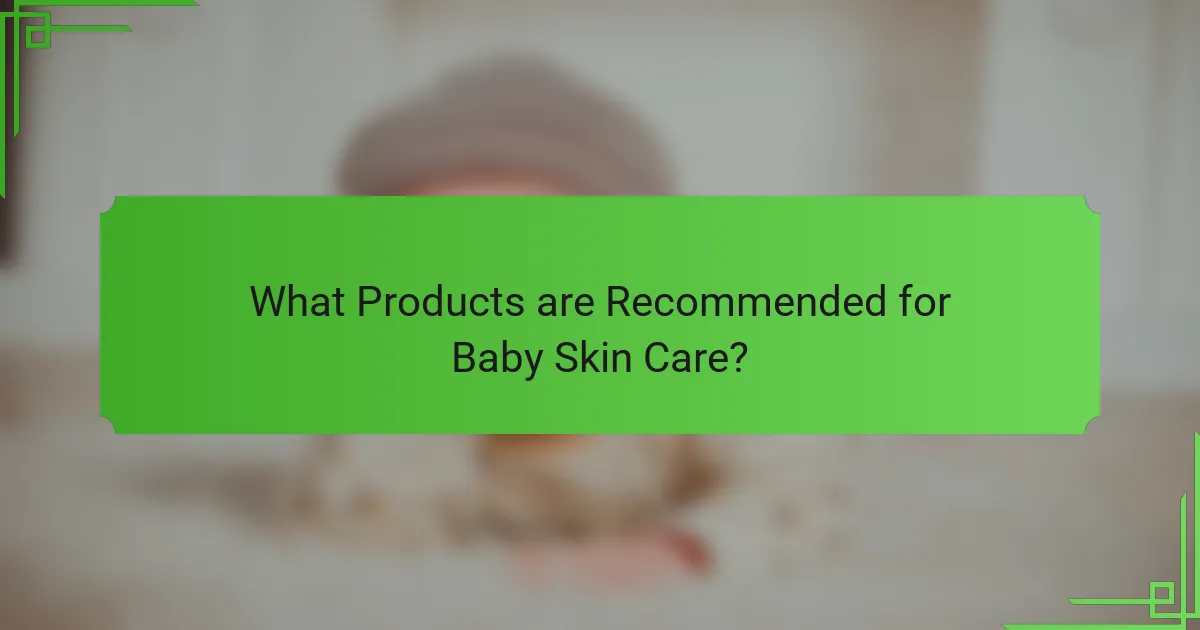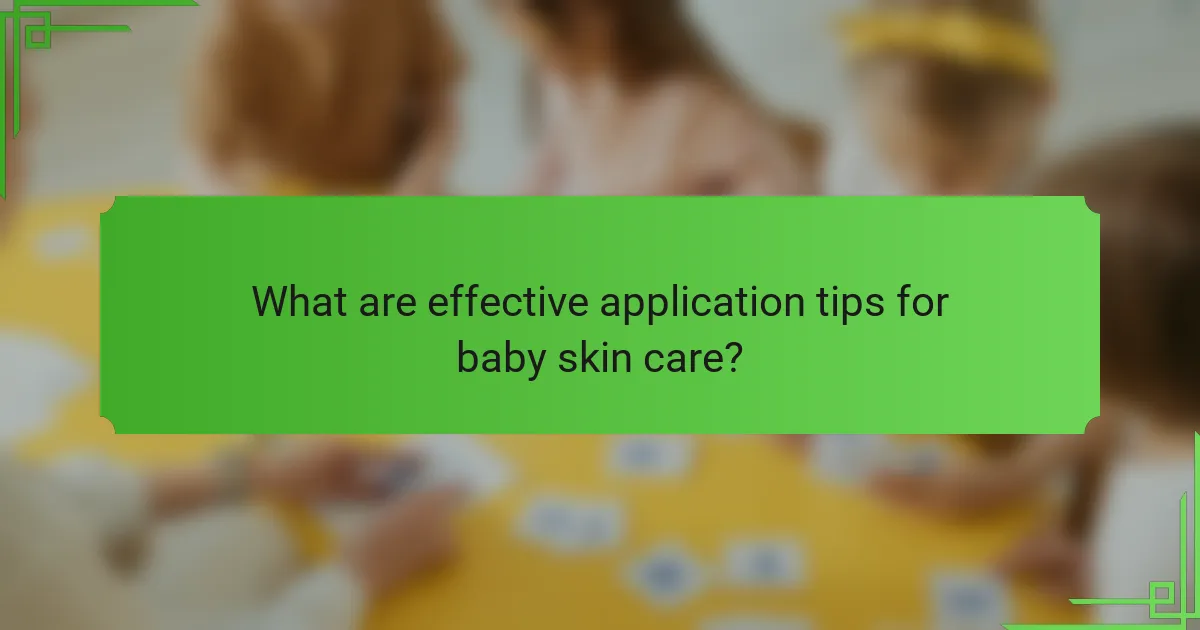Baby skin care essentials focus on products designed specifically for the sensitive skin of infants, including gentle cleansers, moisturizers, and sunscreen. These products help to cleanse without stripping natural oils, maintain hydration, and protect against harmful UV rays. Recommended items include hypoallergenic lotions, fragrance-free options, and diaper rash creams with zinc oxide for effective protection. Proper application techniques, such as using clean hands and massaging products into the skin, are crucial for maximizing the benefits of these skin care essentials while minimizing irritation. The article covers common skin care issues, recommended products, and application tips to support healthy skin development in babies.

What are Baby Skin Care Essentials?
Baby skin care essentials include gentle cleansers, moisturizers, and sunscreen. These products are specifically formulated for a baby’s sensitive skin. Gentle cleansers help remove dirt without stripping natural oils. Moisturizers are crucial for maintaining hydration and preventing dryness. Sunscreen protects against harmful UV rays, which can damage delicate skin. Pediatric dermatologists recommend using fragrance-free products to minimize irritation. Additionally, products with natural ingredients, like aloe vera or chamomile, are beneficial. These essentials support healthy skin development in infants.
Why is baby skin care important?
Baby skin care is important because infants have delicate and sensitive skin. This skin is thinner than [censured] skin, making it more susceptible to irritation and damage. Proper skin care helps maintain the skin’s natural barrier. A healthy barrier protects against environmental factors and allergens. Additionally, effective skin care can prevent conditions like diaper rash and eczema. Research shows that early skin care can promote better skin health in the long term. According to the American Academy of Pediatrics, using gentle, fragrance-free products is crucial for baby skin care.
What unique characteristics does baby skin have?
Baby skin is uniquely thin and delicate compared to [censured] skin. Its epidermis is about 30% thinner, making it more susceptible to irritation. Baby skin has a higher moisture content, which contributes to its softness. The pH level of baby skin is more neutral, around 5.5, unlike [censured] skin, which can be more acidic. This unique pH level helps protect against harmful bacteria. Additionally, baby skin has fewer natural oils, leading to a greater risk of dryness. The skin barrier in infants is still developing, making it less effective at retaining moisture. These characteristics necessitate gentle care products specifically formulated for babies.
How does baby skin differ from [censured] skin?
Baby skin differs from [censured] skin primarily in its structure and function. Baby skin is thinner and more delicate than [censured] skin. It has a higher moisture content, making it softer and more pliable. The epidermis, or outer layer, of baby skin is less developed. This makes it more susceptible to irritants and allergens. Additionally, baby skin has fewer melanocytes, leading to less natural protection against UV rays. The barrier function of baby skin is also not fully matured, increasing the risk of moisture loss. These differences necessitate gentler care products specifically designed for infants.
What common skin issues do babies face?
Babies commonly face several skin issues. Diaper rash is prevalent, affecting nearly 50% of infants at some point. Eczema, also known as atopic dermatitis, appears in about 20% of babies. Cradle cap, characterized by scaly patches, is common in newborns. Baby acne can occur, usually resolving within weeks. Heat rash may develop due to overheating, particularly in warm weather. These conditions are often temporary and manageable with proper care.
What are the signs of diaper rash?
The signs of diaper rash include redness and irritation on the baby’s skin. Affected areas may appear swollen and feel warm to the touch. The skin can develop small bumps or blisters. In some cases, the rash may cause discomfort or fussiness in the baby. Diaper rash often occurs in the diaper area, including the buttocks and thighs. It can be triggered by prolonged exposure to wetness or friction. According to the American Academy of Pediatrics, early identification can help prevent worsening of the rash.
How can dryness and irritation manifest in baby skin?
Dryness and irritation can manifest in baby skin as redness, flakiness, and rough texture. These symptoms often indicate a compromised skin barrier. Babies may also experience itching or discomfort, leading to fussiness. In severe cases, dryness can cause cracks or fissures in the skin. Environmental factors like low humidity and harsh soaps can exacerbate these issues. Additionally, certain skin conditions, such as eczema, can lead to persistent dryness and irritation. It is essential to monitor these signs and provide appropriate care to maintain healthy skin.
What causes baby acne and how can it be identified?
Baby acne is caused by hormonal changes and excess oil production in infants. This condition typically appears as small red or white bumps on a baby’s face. It commonly occurs within the first few weeks of life. Baby acne can be identified by its location, primarily on the cheeks, forehead, and chin. The condition is usually harmless and resolves on its own within a few weeks. Parents can differentiate baby acne from other skin conditions by observing the absence of itching or discomfort. In most cases, no treatment is necessary, as baby acne is temporary.

What products are recommended for baby skin care?
Gentle baby lotion is recommended for baby skin care. It helps to moisturize and protect delicate skin. Look for products that are hypoallergenic and free from harsh chemicals. A fragrance-free option is ideal to avoid irritation. Baby oil can also be used to lock in moisture after bathing. Diaper rash cream is essential for preventing and treating diaper rash. Choose a cream with zinc oxide for effective protection. Additionally, a mild baby soap can be used for cleansing without stripping natural oils. These products are formulated specifically for sensitive baby skin, ensuring safety and effectiveness.
What types of products should be included in a baby skin care routine?
A baby skin care routine should include gentle cleansers, moisturizers, and sun protection. Cleansers help remove dirt and impurities without irritating sensitive skin. Moisturizers keep the skin hydrated and prevent dryness. Sun protection is essential to shield delicate skin from harmful UV rays. Pediatricians recommend using fragrance-free and hypoallergenic products to minimize the risk of allergic reactions. Additionally, products containing natural ingredients like aloe vera and chamomile can soothe and nourish the skin. Regular application of these products helps maintain healthy skin in infants.
Which moisturizers are safe for babies?
Moisturizers safe for babies include those with natural ingredients and no harmful chemicals. Brands like Aquaphor, Cetaphil Baby, and Aveeno Baby are commonly recommended. These products are formulated to be gentle on sensitive skin. They often contain soothing ingredients like aloe vera and chamomile. Pediatricians frequently endorse these brands for infant skin care. It is essential to check for hypoallergenic labels. Avoid products with fragrances, parabens, or dyes. Always conduct a patch test before full application.
What are the best cleansers for baby skin?
The best cleansers for baby skin include gentle, hypoallergenic options specifically formulated for infants. Look for cleansers that are free from harsh chemicals, fragrances, and dyes. Popular choices include products like Cetaphil Baby Wash & Shampoo, Aveeno Baby Cleansing Therapy Moisturizing Wash, and Babyganics Foaming Baby Soap. These cleansers are designed to maintain the delicate balance of a baby’s skin. They help prevent dryness and irritation while effectively cleaning. Pediatric dermatologists often recommend these brands for their safety and efficacy.
How do you choose the right baby skin care products?
Choose baby skin care products based on safety, ingredients, and specific needs. Look for products labeled as hypoallergenic and free from harsh chemicals. Ingredients like water, glycerin, and natural oils are generally safe. Avoid fragrances and dyes, which can irritate sensitive skin. Check for pediatrician recommendations or certifications from dermatologists. Consider your baby’s skin type; for dry skin, opt for thicker creams. For rashes, choose products with zinc oxide or aloe vera. Always perform a patch test before full application to ensure there is no adverse reaction.
What ingredients should be avoided in baby skin care products?
Ingredients to avoid in baby skin care products include parabens, sulfates, and synthetic fragrances. Parabens are preservatives that can disrupt hormonal balance. Sulfates can cause skin irritation and dryness. Synthetic fragrances may lead to allergic reactions. Additionally, alcohol can be harsh on sensitive skin. Essential oils should also be used cautiously as they may irritate. These ingredients can pose risks to a baby’s delicate skin. Research shows that avoiding these substances can lead to healthier skin outcomes for infants.
How can you identify hypoallergenic products?
To identify hypoallergenic products, look for labels that specifically state “hypoallergenic.” These products are formulated to minimize allergens. Research shows that hypoallergenic products contain fewer irritants. Ingredients are often chosen for their low potential to cause allergic reactions. Check for certifications from dermatological organizations. Products tested for allergy potential often carry these endorsements. Additionally, review ingredient lists for common allergens. Avoid products with fragrances, dyes, and parabens, as these can trigger sensitivities.

What are effective application tips for baby skin care?
For effective application of baby skin care products, start with clean hands. Use gentle, fragrance-free products specifically designed for babies. Apply lotions or creams immediately after bath time to lock in moisture. Use a small amount of product; a little goes a long way. Massage the product into the skin using gentle, circular motions. Focus on dry areas, such as elbows and knees. Avoid applying products on broken or irritated skin. Use a soft cloth or cotton pads for application to minimize irritation.
How should you apply moisturizer to a baby’s skin?
Apply moisturizer to a baby’s skin by using gentle, upward strokes. Start with clean hands to avoid introducing bacteria. Use a small amount of moisturizer to prevent greasiness. Focus on dry areas like elbows and knees. Avoid applying too much pressure to sensitive skin. Ensure the product is fragrance-free and suitable for infants. This method helps to lock in moisture effectively. Pediatric dermatologists recommend moisturizing within three minutes after bathing for optimal hydration.
What techniques can help soothe diaper rash?
To soothe diaper rash, keep the affected area clean and dry. Change diapers frequently to minimize moisture exposure. Use a barrier cream containing zinc oxide to protect the skin. Allow the baby some diaper-free time to promote air circulation. Avoid using wipes with alcohol or fragrances, as they can irritate the skin. Pat the area gently with a soft cloth instead of rubbing. If the rash persists, consult a pediatrician for further advice. Studies show that these techniques can effectively reduce irritation and promote healing in diaper rash cases.
How often should products be applied to maintain healthy skin?
Products should be applied to maintain healthy skin at least twice daily. Morning and evening applications help to keep the skin hydrated and protected. Consistent use of moisturizers, cleansers, and treatments is essential for optimal skin health. Research indicates that regular application can improve skin barrier function. This is particularly important for babies, whose skin is more sensitive. Dermatologists recommend establishing a routine early on. Following these guidelines can lead to healthier skin over time.
What are best practices for maintaining baby skin health?
To maintain baby skin health, it is essential to keep the skin clean and moisturized. Regular bathing with mild, fragrance-free soap is important. Limit bath time to avoid drying out the skin. After bathing, apply a gentle moisturizer to lock in moisture. Use products specifically designed for babies to avoid irritation. Dress the baby in breathable fabrics to prevent overheating. Protect the skin from sun exposure with appropriate clothing and baby-safe sunscreen. Regularly check for signs of irritation or rashes and consult a pediatrician if needed. These practices help prevent common skin issues like dryness and rashes.
How can you prevent common skin issues in babies?
To prevent common skin issues in babies, maintain proper hygiene and moisturize regularly. Bathing your baby in lukewarm water helps cleanse the skin without drying it out. Use mild, fragrance-free soaps to avoid irritation. After bathing, apply a gentle moisturizer to lock in moisture. Dress your baby in breathable fabrics to reduce irritation and rashes. Change diapers frequently to prevent diaper rash. Keep your baby’s skin dry and clean, especially in skin folds. Use sunscreen on exposed skin when outdoors to protect against sunburn. These practices are recommended by pediatric dermatologists to ensure healthy skin in infants.
What should you do if a skin issue persists despite treatment?
Consult a healthcare professional if a skin issue persists despite treatment. Persistent skin issues may indicate an underlying condition. A dermatologist can provide a thorough examination. They can recommend appropriate tests to identify specific issues. Treatment options may include prescription medications or specialized therapies. Keeping a record of symptoms and treatments can aid diagnosis. Early intervention often leads to better outcomes. Seeking professional advice is crucial for effective management.
What practical tips can help in baby skin care?
Keep your baby’s skin clean and dry. Bathe your baby with lukewarm water to avoid irritation. Use mild, fragrance-free soap to reduce the risk of allergies. Apply a gentle moisturizer immediately after bathing to lock in moisture. Dress your baby in breathable fabrics to prevent overheating. Change diapers frequently to avoid rashes. Use a barrier cream on the diaper area to protect against moisture. Always check for signs of irritation and consult a pediatrician if needed.
Baby skin care essentials focus on gentle cleansers, moisturizers, and sunscreen specifically formulated for infants’ sensitive skin. The article highlights the importance of proper skin care to maintain a healthy barrier, prevent conditions like diaper rash and eczema, and address common issues such as dryness and baby acne. It discusses recommended products, including hypoallergenic and fragrance-free options, and provides practical application tips to ensure effective skin care. By understanding the unique characteristics of baby skin and following best practices, parents can promote optimal skin health for their infants.
